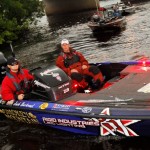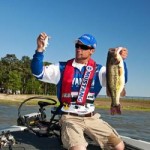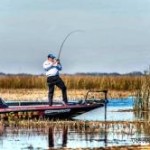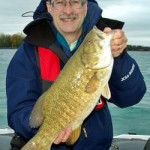Competitors’ Challenges Abound At Feb. 21-23 Bassmaster Classic
from BASS

Josh Bertrand of Arizona
BIRMINGHAM, Ala. — For Josh Bertrand, the first challenge of the GEICO Bassmaster Classic presented by Diet Mountain Dew and GoPro came to him on his way to Alabama’s Lake Guntersville, the fishery for the Feb. 21-23 world championship.
Halfway into his 1,700-mile road trip from his home in Gilbert, Ariz., an ice storm hit. On top of that, he was coming down with a cold.
Under the weather both ways, Bertrand, a 25-year-old who qualified for his first Classic after just one season in the Bassmaster Elite Series, took refuge in a hotel room in Sweetwater, Texas. The ice storm kept him prisoner for two days.
“It wasn’t worth the risk to keep driving,” he said. “The worst situation would have been not being able to get a room, then sleeping in the truck while being sick. That could have ruined the whole Classic for me.”
Fortunately, he had left home early. With this being his first Classic, his plan had been to arrive in Guntersville two days before the practice period began Feb. 14. He wanted to adjust to the time zone change and rest from his trip.
But the best-laid plans…so it went for Bertrand. He finally was able to get on the road again the morning of Feb. 12. A snow storm was east of him. He pushed through, arriving in Guntersville late on Feb. 13, safe and feeling like his cold was better.
That trial behind him, Bertrand knows other Classic challenges are in store. The cold water of shallow Lake Guntersville is one.
“You have to try not to unravel at 1 o’clock when you have only two fish in the boat. This time of year, the bite will likely improve at the end of the day as the water warms,” he said.
For Ott DeFoe — who lives in Knoxville, Tenn., the trip was much easier to Guntersville than Bertrand’s — the big concern is spectator boat traffic.
“It’s something we as competitors always deal with. But it will be more of an issue on Guntersville than other places we’ve been. I expect spectators to be out in droves,” said DeFoe, a Bassmaster Elite Series pro who will be competing in his third consecutive Classic.
“It’s an amazing thing, it’s a flattering thing, it’s part of our sport to have spectators follow us around. But I hope they can keep a reasonable distance, and absolutely, positively, do not fish,” he said. “I don’t just mean to not come in and fish a spot we just left, but to not fish at all. We’ll be gone after three days.”
For Tommy Biffle of Wagoner, Okla., getting the big bite, every day, is at the top of his challenge list. An average of 4-pounders in a five-fish limit — a respectable haul at many events — won’t cut it on Guntersville, he said.
“You bring in a 20-pound bag, you’ll be behind,” said the Elite Series pro who has competed on Guntersville so many times, he’s lost count. “There will be 30-pound bags. So you have to go for the bigger fish. Finding that bite consistently is what you have to do to win.”
The logistics presented by Birmingham weigh-ins and a fishery 70 miles away will be something all 55 competitors must deal with. They can elect to make the drive in the morning from Birmingham, or head back to the lake each evening after weigh-in.
Biffle, who competed in last year’s Classic, when the lake and weigh-ins were a similar distance apart, isn’t too concerned about logistics. It’s all part of the game, and he’s taking it in stride. He’ll be making his 19th Classic appearance within a career that has spanned decades.
“But two-lane roads and driving through towns will slow us down,” he said. “I expect the drive will take more time this year.”
Biffle said he has left his options open. He’s made plans so he can spend his nights in either Birmingham or Guntersville. The decision will hinge on weather conditions and where the weigh-in order leaves him timewise.
Bertrand, who already has had his share of Classic road adventures, has chosen to spend the nights in Birmingham.
“If I get out late after weigh-in, I don’t want to have to drive two hours back to the lake,” Bertrand said. “I think it will be better to be able to relax in the evening.”
Giving himself any advantage extends to keeping a positive mindset, said Bertrand.
“I welcome all these challenges,” he said. “I’m learning to love everything the sport throws at me. I’d love to be the first rookie to win the Classic.”
Winning would bring him $300,000 and the most coveted title in the sport.
Fans are invited to see how the game unfolds at the Birmingham-Jefferson Convention Complex, Feb. 21-23. Arena doors open at 3 p.m. Next door, the Bassmaster Classic Outdoors Expo presented by Dick’s Sporting Goods will be open each day. Expo hours are noon to 8 p.m. Friday; 10 a.m. to 7 p.m. Saturday; and 10 a.m. to 4 p.m. Sunday. All times are CT. There’s no admission charge for any Bassmaster event.
2014 Bassmaster Classic Title Sponsor: GEICO
2014 Bassmaster Classic Presenting Sponsors: Diet Mountain Dew, GoPro
2014 Bassmaster Classic Official Sponsors: Toyota, Bass Pro Shops, Berkley, Evan Williams Bourbon, Humminbird, Mercury, Minn Kota, Nitro Boats, Skeeter Boats, Triton Boats, Yamaha
2014 Bassmaster Classic Outdoors Expo Presenting Sponsor: Dick’s Sporting Goods
2014 Bassmaster Classic Official Apparel Sponsor: Carhartt
About B.A.S.S.
For more than 45 years, B.A.S.S. has served as the authority on bass fishing. The organization advances the sport through advocacy, outreach and an expansive tournament structure while connecting directly with the passionate community of bass anglers through its Bassmaster media vehicles.
The Bassmaster brand and its multimedia platforms are guided by a mission to serve all fishing fans. Through its industry-leading publications — Bassmaster Magazine and B.A.S.S. Times — comprehensive website Bassmaster.com and ESPN2 and Outdoor Channel television programming, Bassmaster provides rich, leading-edge content true to the lifestyle.
The Bassmaster Tournament Trail includes the Bassmaster Elite Series, Bass Pro Shops Bassmaster Open Series, B.A.S.S. Nation events, Carhartt Bassmaster College Series, Bassmaster High School Series, Bassmaster Team Championship and the ultimate celebration of competitive fishing, the Bassmaster Classic.
B.A.S.S. offers an array of services to its more than 500,000 members and remains focused on issues related to conservation and water access. The organization is headquartered in Birmingham, Ala.





